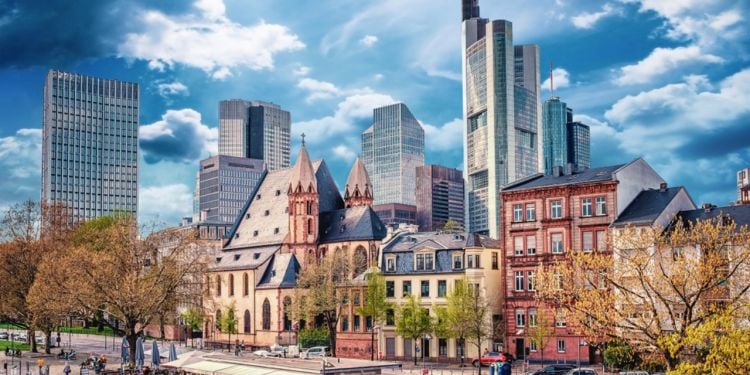Discovering a place to call home is an essential aspect of settling into any city. As one of the major financial hubs in Europe, Frankfurt attracts people from all over the world, resulting in a diverse and multicultural population. From studio apartments to luxurious penthouses, the city has it all to accommodate the wide range of working population it houses.
In this article, we will provide an overview of the housing situation in Frankfurt, including the types of housing available, average rental and property prices, and popular neighbourhoods.
Types of Housing
Frankfurt offers a diverse range of housing options to cater to different lifestyles and preferences. Whether you’re seeking an urban apartment or a spacious suburban home, the city provides a variety of choices. Here are some of the types of housing you can find in Frankfurt:
- Apartments: Apartments are the most common type of housing in Frankfurt. They range from small studio apartments to larger multi-bedroom units. Apartments can be found in high-rise buildings in the city centre as well as in residential complexes throughout the city and its surrounding suburbs.
- Townhouses: Townhouses are a popular choice for those seeking a combination of space and urban living. These multi-story houses are typically connected to neighbouring units, creating a row of residences. Townhouses often feature modern designs and amenities while still providing a sense of community.
- Duplexes: Duplexes are two-unit buildings that are vertically divided, with each unit occupying a separate floor. They provide an alternative to traditional apartment living, offering more privacy and sometimes outdoor space such as a garden or balcony.
- Single-Family Homes: In the suburban areas of Frankfurt, single-family homes are prevalent. These standalone properties range from cozy bungalows to spacious houses with multiple bedrooms, yards, and parking spaces. They are ideal for families or individuals looking for more space and a quieter residential environment.
- Lofts: Frankfurt’s urban revitalization has led to the transformation of former industrial buildings into trendy loft spaces. Lofts are characterised by their open layouts, high ceilings, and exposed brickwork or beams. They often appeal to artists, creatives, and individuals who appreciate unique living spaces.
- Student Accommodations: With several universities and educational institutions, Frankfurt also offers student accommodations. These can include dormitories, shared apartments, or purpose-built student residences, providing affordable housing options for students studying in the city.
Each type of housing in Frankfurt has its own advantages and considerations. Factors such as location, amenities, and proximity to transportation networks play a significant role in choosing the right type of housing that suits your needs and lifestyle.
Rental Market
The rental market in Frankfurt is a bustling and competitive one, driven by the city’s high demand for housing. Renting a property is a popular choice among residents, particularly for expatriates, young professionals, and students. The city has a well-developed rental market with a variety of rental properties available.
- Rental Prices: Rental prices in Frankfurt can vary depending on factors such as location, property size, condition, and amenities. Generally, the closer you are to the city centre or popular neighbourhoods, the higher the rental prices tend to be. As of 2021, the average monthly rent for a one-bedroom apartment in the city centre ranged from €1,200 to €1,500. In the suburbs, the average rent for a similar apartment was around €800 to €1,000. It’s important to note that these prices are subject to change and can vary over time.
- Rental Contracts: Rental agreements in Frankfurt typically follow German tenancy laws, which provide legal protections for both landlords and tenants. Rental contracts are usually long-term, with a minimum duration of one year. It’s common to provide a security deposit, typically equal to one to three months’ rent, which is refundable at the end of the tenancy period.
- Searching for Rental Properties: There are various methods to search for rental properties in Frankfurt. Online platforms, real estate agencies, classified ads, and social media groups are popular resources for finding available rentals. It’s advisable to start the search well in advance, as competition for desirable properties can be fierce.
- Rental Regulations: Tenants in Frankfurt enjoy strong legal protections. Rent increases are generally limited, and tenants have the right to a safe and habitable living environment. It’s essential to familiarise yourself with your rights and obligations as a tenant and understand the terms and conditions of the rental agreement before signing.
- Furnished vs. Unfurnished Rentals: Rental properties in Frankfurt can be either furnished or unfurnished. Furnished apartments come with basic furniture and household items, making them a convenient option for short-term stays or individuals who prefer not to invest in furniture. Unfurnished apartments are typically empty, requiring tenants to provide their own furniture and appliances.
- Rental Market Outlook: It’s worth noting that the rental market in Frankfurt can be competitive, especially for sought-after properties in prime locations. It’s advisable to be prepared with the necessary documents, such as proof of income, employment references, and a Schufa credit report, to increase your chances of securing a rental property.
Navigating the rental market in Frankfurt requires careful consideration and planning. Renting an apartment in Frankfurt can be tricky as it’s a rich city, towering high in the whole of Germany. But, if you are someone looking for a comfortable place to call home, right in the middle of a bustling active city, Frankfurt would do you justice!
However, it is highly recommended that you start your search early, set a budget, and be prepared to act quickly when you find a suitable rental property. Seeking the assistance of a real estate agency or rental professionals can also help streamline the process and provide valuable guidance.
Property Market
Buying a property in Frankfurt can be a good long-term investment due to the city’s strong real estate market. It’s worth noting that prices can vary significantly depending on factors such as location, property size, and amenities.
The property market in Frankfurt is dynamic and reflects the city’s status as a thriving economic and financial hub. Here is an overview of the property market in Frankfurt:
- Property Prices: Frankfurt’s property prices have been steadily rising in recent years, driven by high demand and limited supply. The average price per square metre for an apartment in the city centre can range from €7,000 to €10,000, depending on factors such as location, size, and amenities. In the suburbs, prices can range from €4,000 to €6,000 per square metre. It’s important to note that these prices are subject to market fluctuations and can vary significantly based on individual properties.
- Property Types: The property market in Frankfurt offers a variety of options to cater to different preferences. Apartments are the most common type of property, ranging from compact studios to spacious penthouses. Townhouses, duplexes, and single-family homes are also available, particularly in the suburban areas, offering more space and privacy for families or individuals seeking a residential environment.
- New Developments: Frankfurt has witnessed significant development in recent years, with new residential projects and mixed-use developments transforming the city’s skyline. These new developments often offer modern amenities, contemporary designs, and convenient access to transportation and amenities. However, they may come with a higher price tag compared to older properties.
- Investment Opportunities: Frankfurt’s strong economy and status as a financial centre make it an attractive destination for property investors. The city’s rental market is robust, presenting opportunities for buy-to-let investments. Additionally, the potential for capital appreciation over time is another factor that attracts investors to the Frankfurt property market.
- Financing and Mortgage Options: Obtaining financing for property purchases in Frankfurt is generally accessible. Banks and financial institutions offer various mortgage options to both residents and non-residents, subject to eligibility criteria and creditworthiness. It’s advisable to consult with a mortgage advisor or financial institution to explore the available options and understand the requirements.
- Market Trends: It’s essential to stay updated on market trends and developments in Frankfurt’s property market. Factors such as infrastructure projects, economic conditions, and government policies can influence property prices and demand. Engaging with local real estate professionals or attending property expos and events can provide valuable insights into market dynamics.
Navigating the property market in Frankfurt requires careful research and consideration. It’s important to define your budget, assess your needs, and work with experienced real estate professionals to find the right property that aligns with your goals. Due diligence, including property inspections, legal checks, and understanding the terms of the purchase agreement, is crucial before finalising any property transaction.
Popular Neighbourhoods
Frankfurt is a city composed of diverse neighbourhoods, each with its own distinct character and appeal. Whether you seek a vibrant urban atmosphere or a more tranquil suburban setting, Frankfurt offers a range of popular neighbourhoods to suit different lifestyles. Here are some of the most sought-after neighbourhoods in Frankfurt:
- Sachsenhausen: Situated on the south bank of the Main River, Sachsenhausen is known for its historic charm, picturesque streets, and traditional apple wine taverns. It offers a mix of residential areas, cultural attractions, and a vibrant nightlife scene. Sachsenhausen is also home to the Museumsufer, a collection of museums showcasing art, history, and more.
- Nordend: Located to the north of the city centre, Nordend is a trendy and lively neighbourhood popular among young professionals, artists, and families. It features beautiful parks, charming cafes, and a variety of shops and boutiques. Nordend is known for its bohemian atmosphere, art galleries, and vibrant food scene.
- Westend: Westend is an upscale and prestigious neighbourhood situated west of the city centre. It is characterised by elegant residential buildings, tree-lined streets, and spacious parks. Westend is also home to the Palmengarten, a stunning botanical garden, as well as several diplomatic missions and institutions.
- Bockenheim: Bockenheim is a vibrant and diverse neighbourhood located to the northwest of the city centre. It is home to the Goethe University campus, making it popular among students and academics. Bockenheim boasts a mix of residential areas, cultural venues, and a lively street known as Leipziger Straße, offering a wide range of shops, restaurants, and cafes.
- Bornheim: Situated east of the city centre, Bornheim is a lively and family-friendly neighbourhood. It has a unique charm with its narrow streets, colourful houses, and a bustling weekly market. Bornheim is known for its vibrant social scene, with numerous bars, restaurants, and cultural events.
- Ostend: Located east of the city centre, Ostend has experienced significant revitalization in recent years. It is known for its contemporary architecture, creative spaces, and trendy cafes. The neighbourhood also houses the ECB (European Central Bank) headquarters and the popular Hafenpark, a park along the Main River.
These neighbourhoods represent just a glimpse of the diverse options available in Frankfurt. Each neighbourhood offers its own unique atmosphere, amenities, and proximity to transportation networks. When choosing a neighbourhood, consider factors such as proximity to work, lifestyle preferences, access to schools and amenities, and your budget. Exploring these neighbourhoods firsthand will provide a better understanding of which area aligns with your needs and preferences.
Housing Affordability
While Frankfurt is known for its high cost of living, housing affordability can vary depending on individual circumstances. The city’s strong job market and high salaries often offset the higher cost of housing.
As a major financial hub and a desirable place to live, Frankfurt’s housing market reflects its prosperous status, which can result in higher prices compared to other German cities.
- Rental Affordability: Rental prices in Frankfurt can be relatively high, particularly in popular neighbourhoods and areas close to the city centre. The cost of renting an apartment or house will depend on factors such as location, size, condition, and amenities. While there are affordable options available, it may require diligent searching and considering neighbourhoods further from the city centre or sharing accommodations with roommates to reduce costs.
- Property Purchase Affordability: Buying a property in Frankfurt can be a significant financial commitment. Property prices in desirable areas, such as the city centre or prestigious neighbourhoods, tend to be higher. However, there are more affordable options available in suburban areas or neighbourhoods farther from the city centre. It’s important to carefully consider your budget, explore mortgage options, and conduct thorough research to find properties within your financial means.
- Affordability Challenges: The strong demand for housing in Frankfurt, coupled with limited supply, can pose challenges to housing affordability. As a result, there may be a gap between housing supply and demand, leading to price increases and competition among buyers and renters. Additionally, the influx of international companies and expatriates in Frankfurt can contribute to higher housing costs, especially in areas favoured by expat communities.
- Government Initiatives: The German government has implemented various initiatives to address housing affordability concerns. These include regulations on rent increases, protection for tenants, and the promotion of affordable housing projects. It’s worth exploring government programs and incentives that may assist individuals or families in accessing more affordable housing options.
- Commuting and Suburban Areas: One strategy to enhance housing affordability is considering suburban areas surrounding Frankfurt. These areas often offer more affordable housing options while maintaining convenient access to the city centre through public transportation networks. Commuting from nearby towns and suburbs can provide a balance between affordability and proximity to job opportunities in Frankfurt.
When considering housing affordability in Frankfurt, it’s crucial to assess your own financial situation, determine your budget, and prioritise your housing needs. Researching different neighbourhoods, exploring rental or property listings, and seeking professional advice can help you make informed decisions based on your financial circumstances and desired living standards.
Rental Regulations
It’s important to be aware of the rental regulations in Frankfurt. The rental market in Germany is highly regulated, and tenants enjoy strong legal protections. Rent increases are generally limited, and tenants have the right to a safe and habitable living environment. It is recommended to familiarise yourself with the local rental laws and consult a real estate professional or legal advisor when entering into a rental agreement.
- Tenancy Agreement: A tenancy agreement is a legally binding contract between the landlord and the tenant. It outlines the rights and obligations of both parties, including the duration of the tenancy, rent amount, payment terms, maintenance responsibilities, and termination conditions. It is common for rental agreements in Frankfurt to have a minimum duration of one year.
- Rent Control: Germany has implemented rent control measures to regulate rent increases. In Frankfurt, rental prices are subject to the “Mietpreisbremse” (rental price brake), which limits rent increases on new leases in certain areas. The rental price brake restricts the maximum rent to a specific percentage above the local reference rent, which is determined by the local authorities.
- Security Deposit: Landlords in Frankfurt often require tenants to provide a security deposit, known as “Kaution.” The security deposit is typically equivalent to one to three months’ rent and is held by the landlord throughout the tenancy. At the end of the tenancy, the landlord must return the deposit, minus any valid deductions for unpaid rent or damages beyond normal wear and tear.
- Tenant Protection: Tenants in Frankfurt enjoy various legal protections. Landlords are responsible for maintaining the rented property in a habitable condition and ensuring that it meets safety and health standards. Tenants have the right to request necessary repairs or improvements, and landlords must address these issues in a timely manner. It is also illegal for landlords to evict tenants without valid reasons and proper legal procedures.
- Termination of Tenancy: Both landlords and tenants have specific rights and procedures when it comes to terminating a tenancy. In most cases, tenants are required to provide notice to the landlord in advance, typically three months, before moving out. Landlords must provide a valid reason for termination, such as non-payment of rent or breach of the rental agreement, and follow legal procedures to evict a tenant.
- Dispute Resolution: In case of disagreements or disputes between landlords and tenants, various avenues for resolution are available. Mediation services, tenant associations, or legal representation can help resolve conflicts and ensure that the rights of both parties are protected.
Conclusion
Housing in Frankfurt offers a diverse range of options, from apartments in the bustling city centre to family homes in the suburbs. While the cost of housing can be high, the city’s strong economy, job opportunities, and quality of life make it an attractive place to live. Whether renting or buying, it is important to research the market, consider personal preferences and budgets, and seek professional advice when navigating the housing market in Frankfurt.









